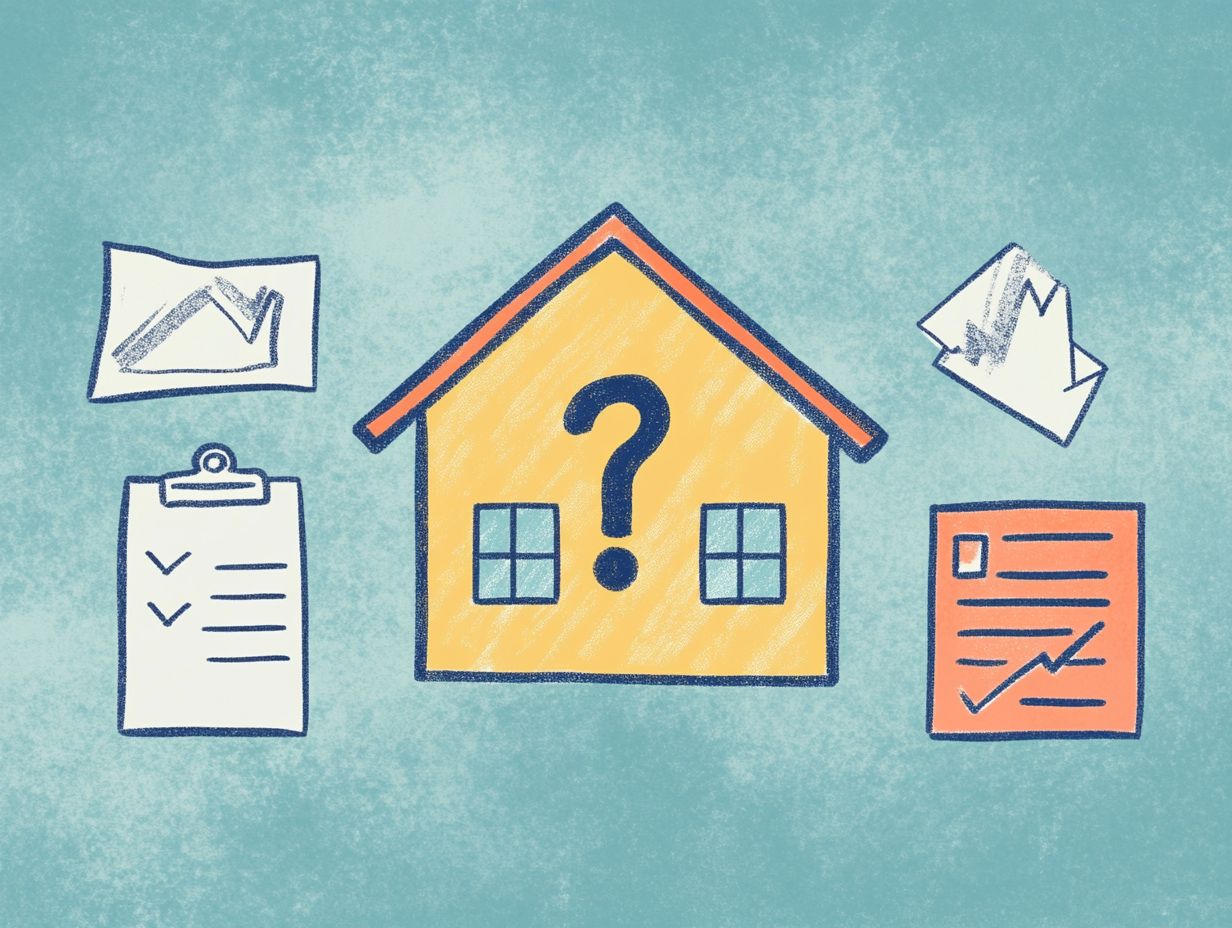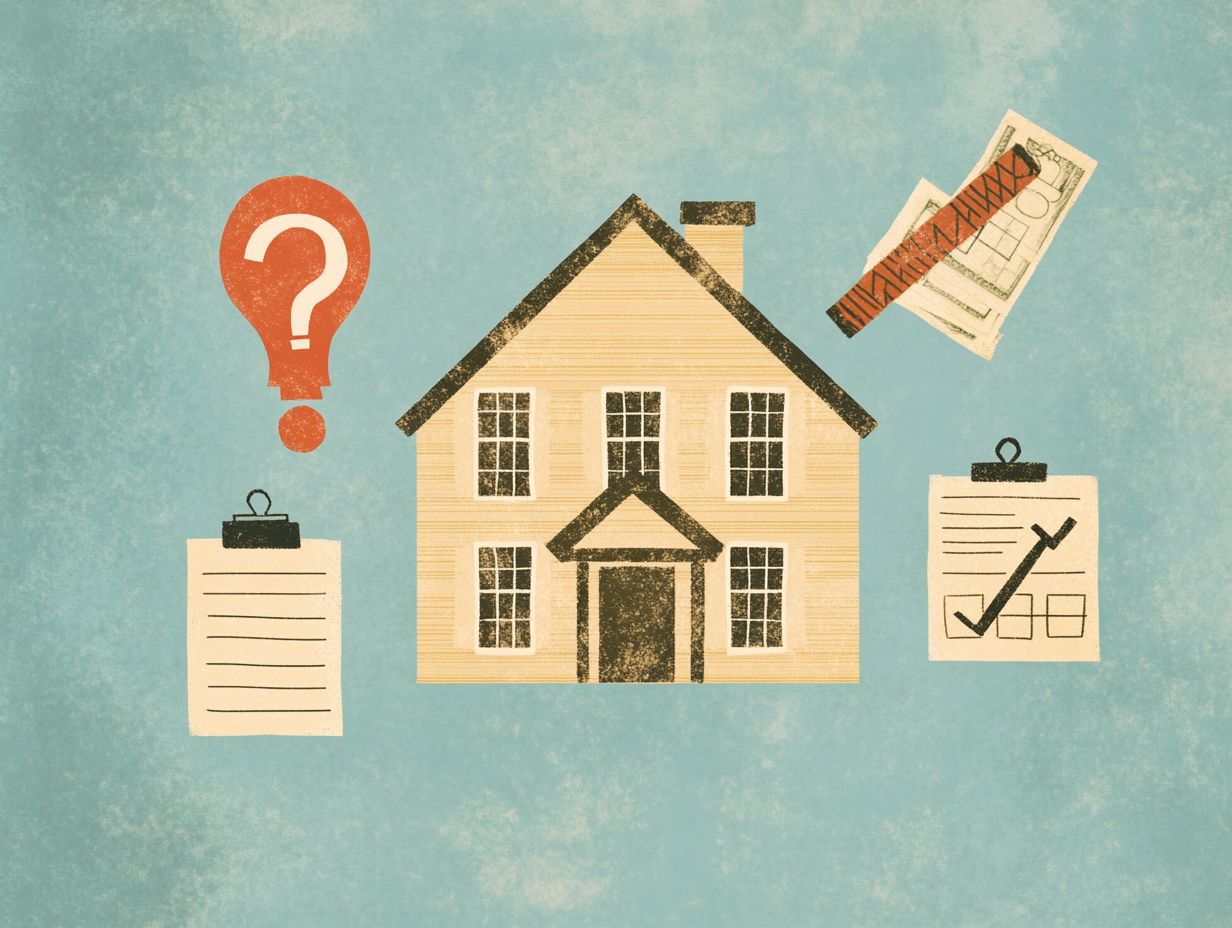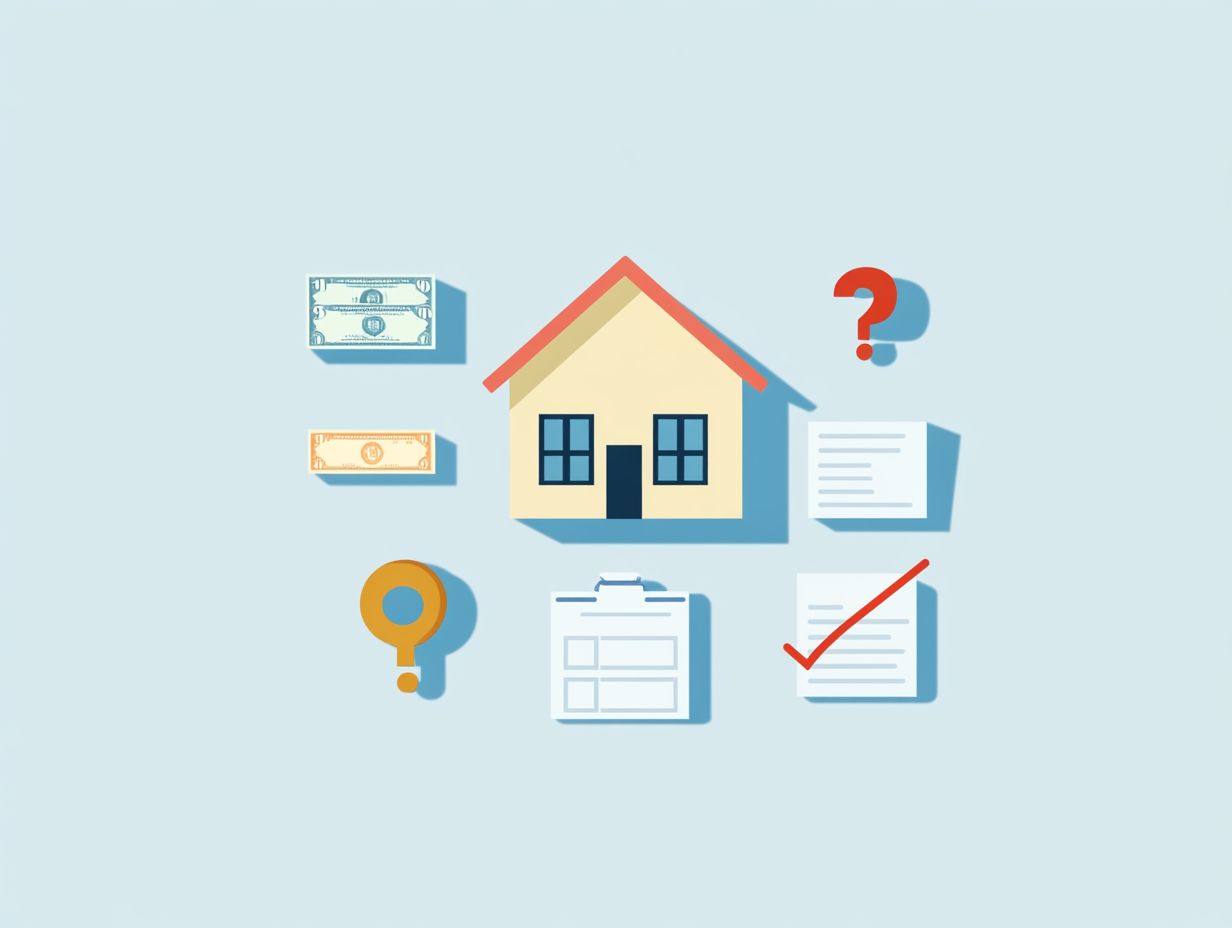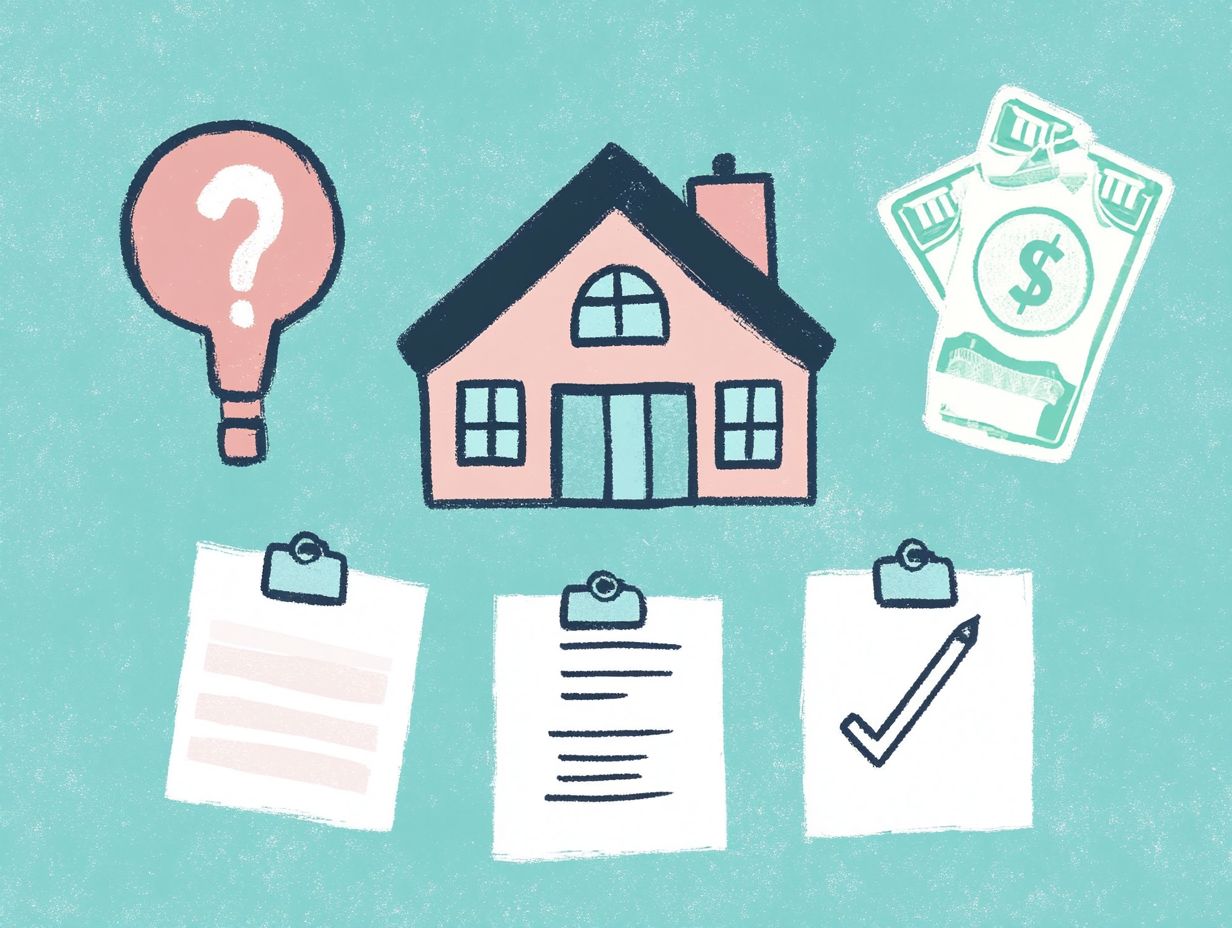5 Myths About FHA Loans You Should Know
Navigating the world of home financing can feel overwhelming, especially with the myriad of myths swirling around FHA loans. You might have heard that these loans are exclusively for first-time buyers or that they come with sky-high interest rates.
This article sets the record straight by debunking five common misconceptions about FHA loans. It dives into who can actually qualify, the benefits they provide, and how they can be a savvy choice for a range of homebuyers.
Whether you’re on the hunt for your first home or considering refinancing, grasping these essential facts will empower you to make informed financial decisions.
Contents
- Key Takeaways:
- 1. FHA Loans Are Only for First-Time Homebuyers
- 2. FHA Loans Have High Interest Rates
- 3. Only Low-Income Borrowers Can Qualify for FHA Loans
- 4. FHA Loans Require a Large Down Payment
- 5. FHA Loans Are Only for Single-Family Homes
- What Is an FHA Loan and How Does It Work?
- Frequently Asked Questions
- What are some common myths about FHA loans?
- Do I have to be a first-time homebuyer to qualify for an FHA loan?
- Are FHA loans only for low-income individuals?
- Do FHA loans have strict income requirements?
- Can I only use an FHA loan to purchase a single-family home?
- Do I have to pay mortgage insurance for the entire life of an FHA loan?
Key Takeaways:
Here are the most important things to know about FHA loans:
- FHA loans aren t just for first-time homebuyers; they re available to anyone who meets the eligibility requirements.
- Contrary to popular belief, FHA loans do not always have higher interest rates than traditional loans.
- Even borrowers with higher incomes can qualify for an FHA loan, as there is no maximum income limit.

1. FHA Loans Are Only for First-Time Homebuyers
Surprise! FHA loans aren t just for first-timers; they re for anyone who meets the requirements. FHA-insured loans are also available to repeat buyers seeking affordable housing options in the real estate market.
If you re looking to refinance your current mortgage, you can benefit from FHA’s more lenient rules, which may help you lower your monthly payments or secure better rates.
For those interested in multifamily properties, FHA loans can be quite appealing, allowing you to use these financing options to expand your rental portfolio.
The flexibility of FHA guidelines caters to a diverse range of borrower experiences, accommodating individuals with varying credit histories and down payment capabilities. Understanding the different types of loans available is crucial as you navigate the complex world of home financing; it can unlock numerous opportunities beyond merely purchasing your first home.
2. FHA Loans Have High Interest Rates
A prevalent myth about FHA loans is that they carry higher interest rates compared to conventional loans. In reality, FHA loans often offer competitive interest rates, especially for borrowers with lower credit scores.
This competitive edge is largely due to the rules lenders use to decide if you qualify for a loan set by the Federal Housing Administration, which aim to make homeownership more attainable. You might find that interest rates for FHA loans are quite favorable when compared to conventional loans, which typically cater to those with higher credit ratings.
Your credit score plays a crucial role in determining the interest rate; even if it s on the lower side, you can still reap the benefits and options provided by FHA programs. FHA mortgage insurance can also lower your overall loan costs, making it an attractive choice in various market conditions where interest rates can be volatile due to economic indicators.
3. Only Low-Income Borrowers Can Qualify for FHA Loans
While FHA loans were designed to promote affordable housing, the common misconception that they re only for low-income borrowers overlooks the wider range of eligibility criteria that accommodate various income levels and financial situations.
These loans can be advantageous for a diverse group of applicants, including those with credit scores as low as 580, enabling many to qualify despite earlier financial hurdles. It s essential for you to demonstrate proof of a steady income that meets minimum thresholds, highlighting the significance of sound financial habits.
Interestingly, middle-income and even higher-income individuals often find FHA loans appealing due to their competitive interest rates and lower down payment requirements. This accessibility truly opens the door for a broader audience, showing that FHA loans are not just a safety net for struggling buyers, but a valuable option for anyone seeking favorable mortgage terms.
Don t miss out on these benefits! Start your journey to homeownership today with FHA loans!
4. FHA Loans Require a Large Down Payment

One of the most common misconceptions you may find about FHA loans is the belief that they require a large down payment. In reality, these loans offer flexible down payment options as low as 3.5%. This makes the dream of homeownership much more attainable for a variety of borrowers.
Compared to conventional loans, which typically demand a minimum down payment ranging from 5% to 20% based on your credit profile, the FHA’s requirements are refreshing. If you’re looking for even more financial relief, down payment assistance programs can dramatically reduce your upfront costs, allowing eligible buyers to bridge that initial financial gap.
These programs often come in the form of grants or forgivable loans, significantly easing the burden of those initial expenses. If you’re already a homeowner considering refinancing, understanding these costs is crucial.
You may discover that FHA refinancing is more forgiving, potentially leading to lower monthly payments and a smoother transition into new loan terms.
5. FHA Loans Are Only for Single-Family Homes
The idea that FHA loans are limited to single-family homes is a common misconception. These loans can also finance multifamily properties, allowing you to explore a broader range of housing options under FHA guidelines and HUD financing.
This versatility opens doors for potential income generation through rental properties, making it an enticing choice for anyone looking to expand their real estate portfolio. Multifamily loans serve as invaluable financing for investment properties, acting as a bridge to building wealth over time.
Properties approved by the Department of Housing and Urban Development (HUD) add an extra layer of security and credibility for you as a buyer. They underscore the importance of adhering to safety and quality standards. These guidelines not only create a more stable investment environment but also shape the overall dynamics of the real estate market.
What Is an FHA Loan and How Does It Work?
An FHA loan is a government-backed mortgage that you can obtain from approved lenders and is insured by the Federal Housing Administration (FHA). This program is designed to help you buy a home, regardless of your credit history or financial situation, making the loan approval process smoother and more favorable.
This program is especially advantageous for first-time homebuyers who may be challenged by smaller down payments or less-than-stellar credit scores. With lower down payment options and flexible qualification criteria, it opens doors that might otherwise remain closed.
The Department of Housing and Urban Development (HUD) plays a vital role in overseeing the FHA, ensuring that its programs meet the community’s needs.
Mortgage insurance is a key component of this loan; it safeguards lenders against potential losses and contributes to a more stable housing market. FHA loans empower you by making homeownership more accessible while also promoting affordable housing solutions and strengthening the real estate industry.
What Are the Benefits of an FHA Loan?
FHA loans offer numerous benefits tailored to your needs, including lower down payment requirements, flexibility with credit scores, and the ability to finance both single-family and multifamily properties. This makes them an appealing choice for a diverse range of borrowers in today s housing market.
Borrowers often enjoy lower interest rates compared to conventional loans, significantly reducing monthly payments. This affordability helps you manage your financial obligations more effectively, especially if you re dealing with student loan debt or other financial challenges.
With flexible loan terms, your payments can fit your financial situation. Plus, FHA mortgage insurance presents distinct advantages, allowing a broader segment of the population to secure funding and laying a solid foundation for homeownership and long-term financial stability.
These factors come together to empower you to embark on your journey toward owning a home with confidence!
What Are the Eligibility Requirements for an FHA Loan?

To qualify for an FHA loan, you must meet specific eligibility requirements.
This includes maintaining a minimum credit score, providing an appropriate down payment, and submitting documentation that shows your financial stability through a full loan application.
These criteria help you prove you re ready for homeownership! They also assist lenders in assessing the risk of default.
Typically, a credit score of at least 580 is required for a 3.5% down payment. If your score falls between 500 and 579, you may still qualify, but you ll need to increase your down payment to 10%.
You ll also need to submit proof of steady income, employment history, and other important financial documents. All of these play a critical role in the approval process.
By adhering to these requirements, lenders can make informed decisions regarding temporary approvals, ultimately helping to minimize their risk.
What Are the Different Types of FHA Loans?
FHA loans offer a variety of options tailored to meet your specific needs.
This includes traditional FHA-insured loans, multifamily loans for investment properties, and construction loans for new builds.
Each type serves a unique purpose, helping you whether you’re a first-time homebuyer seeking affordable financing or a seasoned investor aiming to expand your portfolio.
The traditional FHA-insured loan is particularly advantageous for individuals with lower credit scores or limited savings. It allows for lower down payments and more flexible qualifying criteria.
On the other hand, multifamily loans empower you to invest in properties with multiple units, creating both living spaces and income-generating opportunities.
If you’re looking to construct your dream home, FHA construction loans provide a practical path, ensuring that funding is accessible throughout the building process.
If you already have an FHA loan, you can take advantage of refinancing options. This allows you to benefit from lower interest rates or modify your loan terms to better suit your financial situation.
What Are the Common Misconceptions About FHA Loans?
Numerous misconceptions about FHA loans can easily mislead you as a potential borrower.
Many believe that high interest rates, hefty down payments, and strict eligibility criteria exist, which may keep you from exploring the many advantages these flexible financing options offer.
These misunderstandings create a general reluctance to view FHA loans as viable avenues toward homeownership.
For example, it s common to assume that FHA loans come with sky-high interest rates. In reality, they often provide competitive rates, making them an attractive option for first-time buyers.
The belief that you need to make a substantial down payment can also hold you back, especially when many FHA loans require as little as 3.5% down.
By dispelling these prevalent myths and clarifying the eligibility requirements, you can fully recognize how FHA loans can open doors to your dream home, offering more accessible financing opportunities than you may have imagined.
How Can One Apply for an FHA Loan?
Applying for an FHA loan is a well-structured process.
You need to submit a loan application, provide necessary documentation, and undergo an evaluation of your mortgage credit to determine your eligibility and approval.
Your journey begins by gathering essential paperwork, including proof of income, tax returns, and your credit history.
You ll also need to provide documentation of your employment, bank statements, and any other financial obligations that could impact your loan.
Once you ve gathered all the necessary documents, submitting your application is your first step toward homeownership.
As the process unfolds, it s crucial to understand the underwriting phase. This is where your financial standing is evaluated in detail. Being prepared with accurate and comprehensive information can significantly enhance your application.
Your experience as an applicant is vital; seasoned individuals often navigate potential obstacles with greater ease.
It s wise to stay proactive in addressing any credit issues that may arise during the review. This ensures a smoother progression toward approval.
Frequently Asked Questions

What are some common myths about FHA loans?
Some common myths about FHA loans are that they are only for first-time homebuyers or low-income individuals. They also have a reputation for strict income limits.
Do I have to be a first-time homebuyer to qualify for an FHA loan?
No, you don t have to be a first-time homebuyer. FHA loans are open to anyone who meets the eligibility requirements, which generally include having a steady income and a reasonable credit score.
Are FHA loans only for low-income individuals?
No, FHA loans aren t just for low-income individuals. They are available to a wide range of incomes. The income limits can differ based on where the property is located.
Do FHA loans have strict income requirements?
FHA loans have income limits, but they re not as strict as many believe. Requirements can vary between lenders and locations, so it s crucial to compare options.
Can I only use an FHA loan to purchase a single-family home?
No, you can use an FHA loan for different types of properties. This includes single-family homes, multi-family homes, condos, and manufactured homes.
Do I have to pay mortgage insurance for the entire life of an FHA loan?
No, you don t have to pay mortgage insurance for the loan s entire life. You might only need it for a limited time, depending on your loan amount and down payment. You can save money by canceling mortgage insurance once you build enough equity!






